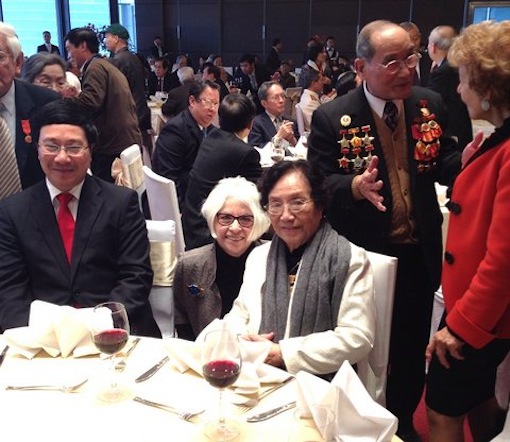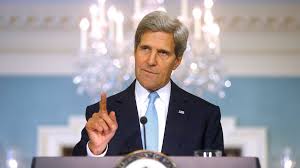Getting Ahead
This photo of my parents reveals much about their personalities (hers vivacious and outgoing, his withdrawn and closed off), their relationship (little real contact), and also the times (could be captioned Gender Roles in the 1950s: The Bathing Beauty and the Soldier).
The typicality of their lives reveals much about the USA. My mother was a farmer’s daughter whose father lost the farm to the banks, and they had to scrabble along in the slums of the big city, St. Louis. All her life she yearned for her bucolic childhood when everything was “nice.” My father was a coal miner and the son of a coal miner from West Virginia. He hated the mines so much that after the Second World War he stayed in the military as a professional soldier.
Both were imbued with the all-American drive to get ahead of the pack, to wrest advantage over others. My mother’s great-great-grandfather had gotten ahead by owning slaves, using their stolen labor to become wealthy. Although he died decades before she was born, she spoke of him with patriarchal reverence, telling what a good master he had been. His slaves loved him so much that during the Civil War they protected him from Yankee soldiers by hiding him in a well, then hauling him back up when they were gone.
She admitted that not all masters were that kind, though, and she felt slavery wasn’t a good thing. But it was the only way for the Negroes to come to America. Most of the Europeans could afford to pay their way over, but the Africans didn’t have money, so they signed up to be slaves in order to come here. Deep down my mother knew this wasn’t true, but she repeated it as a litany to shore up the family myth that great-great-grandfather had been a good man, hadn’t done anything wrong in achieving his success. When slave labor ended, so did the family’s advantage. Their fortunes declined, and her father lost the farm in the 1920s before the Depression. But they were still much better off than the descendants of the people whose unpaid work had generated the wealth.
[pullquote]Both my parents were imbued with the all-American drive to get ahead of the pack, to wrest advantage over others. My mother’s great-great-grandfather had gotten ahead by owning slaves, using their stolen labor to become wealthy.[/pullquote]
My father managed to become an officer in the Second World War, making the leap from working class to middle class. In the 1950s he was stationed in Colorado as the state coordinator for civil defense. He organized the Ground Observer Corps, groups of citizens who gathered on the roofs of tall buildings to scan the skies with their binoculars. He gave them cards showing silhouettes of Soviet bombers, and if they saw an airplane that resembled those, they were supposed to immediately inform the authorities. He gave presentations on making basement bomb shelters: where the secure corners are, how much food and water to store, how to give first aid for radiation burns. When I eagerly asked him when we would be making our bomb shelter, he said we weren’t going to: Basement shelters were useless against atomic weapons. The whole thing was just a scare campaign to convince the public of the need for a strong military to counter the communist threat. He didn’t disapprove of the campaign, though. It was his job, providing us with food, clothing, and bombless shelter of considerably higher quality than coal mining would have.
But he chafed under the limited horizons of military life and was always seeking ways to get ahead, to get rich. One of these was through radio stickers. When the communists attacked, all the commercial radio stations were going to stop broadcasting and clear the airwaves for two military stations that would inform the public on civil defense measures. My father invented stickers that people could buy and put on their radio dial at the frequencies of these two stations so they could instantly find them. But the invention was not a great success. Since all the other stations would be off the air, anyone could just spin the dial and find the two military stations.
He also invented a clever display mechanism that would make beer bottles appear to float in the air behind the bar, circling and hovering in front of the eager customers. He journeyed to the headquarters of the major beer companies and presented it to the marketing managers, but none of them recognized its brilliance.
Although fortune eluded him, he found military success in Colorado and was promoted several times. The state was fertile ground for civil defense; the threat of war and annihilation was deeply rooted. The first defenses were forts erected against the Native Americans from whom the Europeans had stolen the land. These forts and their commanders are proudly commemorated today in the names of cities and military bases. Some have been restored as shrines for patriotic indoctrination.
[pullquote]Denver was the manufacturing site for the state-of-the-art intercontinental missile, the Titan. Colorado was where the wild-west mentality merged with foreign policy.[/pullquote]
In the 1950s Cheyenne Mountain, a granite colossus towering above Colorado Springs and named after a nearly exterminated Native nation, was hollowed out to serve as a military headquarters during the upcoming war. Even if the rest of the country were being incinerated, the commanders could still fire intercontinental ballistic missiles on the Soviets from there. The new Air Force Academy near Colorado Springs was training the next generation of bomber pilots and missile experts. The Rocky Flats Arsenal near Denver produced hydrogen bombs and contaminated the air, land, and water with radioactive poisons. The uranium used to make the bombs was mined in the state under negligent supervision, resulting in toxic residues and increased cancer rates. Denver was also the manufacturing site for the state-of-the-art intercontinental missile, the Titan. Colorado was where the wild-west mentality merged with foreign policy.
All this is madness of course, a monstrous psychosis, and it affects our minds on the subconscious level. The psychotics among us are particularly sensitive to these signals, and they act on them. It’s no accident that Denver has been the site of so many mass murders. The first one was in 1955 at the height of the H-bomb terror. A fault line in the collective consciousness cracked under the stress, and a young man put a bomb in his mother’s suitcase as she was flying away for a trip. Everyone in the plane died. This was the first time anyone had done anything like that, and the country was aghast. But the man proved to be a pioneer; since then mass murder has become commonplace. The people follow their leaders. The Columbine School shooting in 1999 happened in the same suburb as the Titan missile factory. The Dark Knight shooting in 2012 happened only a few miles from Rocky Flats Arsenal. Colorado is also home to Guantánamo West, the new supermax prison for terrorists. And Colorado Springs has become a center of the evangelical Christian movement, fundamentalists praying to their patriarchal God to spare them from the fires of hell.
My mother was a moderate Christian, sincere in her Presbyterian faith but seeing the institution as a practical arena for getting ahead. As befitting my father’s rank, we lived in a lower-middle class suburb of Denver (Aurora, the site of the Dark Knight shooting). As their marriage crumbled, largely on account of father’s drinking, mother had the foresight to develop a strategy for advantage. Shunning the local Presbyterian church, she joined one in the old rich section of Denver and hauled her children there every Sunday for services. She became active in the church, and after the divorce she was elected chairperson of the middle-aged singles social group. One of her duties was to welcome new members into the group. When a wealthy older man, recently widowed, joined it, her ample beauty and charm soon won her a new husband. She was a dutiful and attentive wife, and he was happy, not knowing that she never loved him.
His father had owned a rock quarry and amassed a small fortune by paying his workers (miners of a sort, like my father and his father had been) just enough to keep them working. My genteel last name comes from him. I started life as a Schuster.
My mother’s leap into the upper-middle class gave her children advantages, enabling my brother and me to attend Ivy League universities. We’ve been able to get ahead. Now the family fortunes are restored to what they were in the days of slavery. Success!
The American Dream is built on the American Nightmare.
*
ABOUT THE AUTHOR
Senior contributing editor William T. Hathaway is an adjunct professor of American studies at the University of Oldenburg in Germany. His latest book, Wellsprings, concerns the environmental crisis: http://www.cosmicegg-books.com/books/wellsprings. He is a member of the Freedom Socialist Party (www.socialism.com). A selection of his writing is available at www.peacewriter.org.










